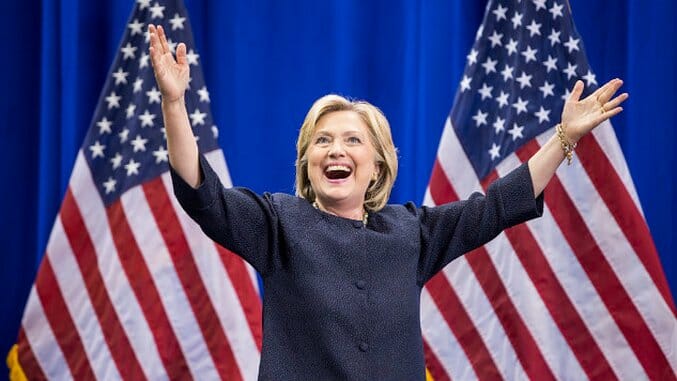How Much Can Progressives Really Trust Hillary Clinton With the Supreme Court?
Photo by Scott Eisen/Getty
Last November I wrote an article for Salon titled, “More Like Reagan, Less Like FDR: I’m a Millennial and I’ll Never Vote for Hillary Clinton,” and it went viral. The core of that piece was a political analysis of Clinton as a candidate and the times in which we are living today, coming to the conclusion that the two are mismatched. As with anything containing a political message that gets widely shared online, the piece was soon subjected to the surgical, scrutinizing eye of the internet. And, par for the course, it was controversial.
The rebuttal I kept seeing was the case for the Supreme Court of the United States—specifically, who would be appointing the next two (or perhaps more) justices. My recent interview on CNN in which I personally endorsed Green Party candidate, Jill Stein, for the presidency (despite several misgivings I have about some of her policy positions), was met with this same line of criticism: “Do you want a Trump Supreme Court?”
Even now, as we are discovering through email leaks that the 2016 Democratic primary process was skewed from the beginning by a culture of bias towards Hillary Clinton at the highest levels of party leadership, which has prompted both the DNC chair and CEO to resign (thus far), there are those who swear up and down that Donald Trump is the worst thing for our democracy since Hitler was plotting taking over New York—all because of who he might appoint to the Supreme Court. Indeed, we keep hearing this argument on repeat from liberal publications and commentators—and nobody ever questions its validity. It is accepted prima facie, and sacrosanct to voters on the left.
On paper, there is merit to the position. The candidates have outlined very different visions for whom they would appoint. Trump, of course, has praised the late conservative Justice Antonin Scalia, and called the ultra-right wing Justice Clarence Thomas, his “favorite,” saying he was both “strong” and “consistent.” On the other side, Clinton has promised that her litmus test for nominees will be their willingness to overturn the controversial Citizens United v. FEC decision.
But this argument hinges on whether or not one trusts either candidate—and I do not.
Where Donald Trump is concerned, I am a big believer in the notion that our friends and social contacts reveal something about who we are as people. “Birds of a feather,” as they say. In this case, the GOP nominee has, for decades, surrounded himself with the New York liberal elite. The Clintons, besides being his golf buddies, and sharing an address in Delaware to avoid taxes, were guests at his wedding. More than that, they have been political allies on issues like universal health care. Even in this election, for however contradictory it may be to the plans he’s put forth on paper and the people he’s currently surrounding himself with, Donald Trump has brought populism back to the Republican platform, which now contains arguably stronger language than its Democratic counterpart when it comes to reimplementing the Glass-Steagall banking reform:
GOP: “We support reinstating the Glass-Steagall Act of 1933 which prohibits commercial banks from engaging in high-risk investment.”
Democratic: “Democrats support a variety of ways to stop this from happening, including an updated and modernized version of Glass-Steagall as well as breaking up too-big-to-fail financial institutions that pose a systemic risk to the stability of our economy.”
His record is also not all that conservative, having been for universal health care and pro-choice (until recently).
Much as his current rhetoric angers and frightens me, I find Trump’s newfound conservatism hard to believe which is why I have no clear preference in this election for either of the major party nominees.
For her part, Hillary Clinton has a tendency to favor expediency to moral hardlines, and a record wooing conservative voters like her husband did in the 90’s. Her political appointments are a part of that record, which is why I worry about who should would nominate to the Supreme Court.
-

-

-

-

-

-

-

-

-

-

-

-

-

-

-

-

-

-

-

-

-

-

-

-

-

-

-

-

-

-

-

-

-

-

-

-

-

-

-

-








































